Issue No.19 / December 1-15,2015
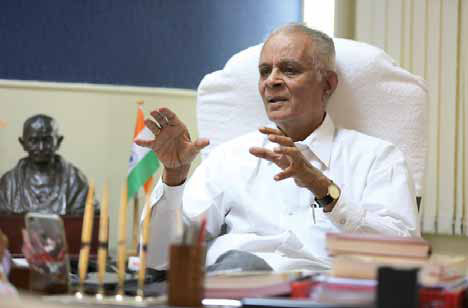
Despite a vast educational system, India has the lowest gross enrolment ratio, compounded by a mismatch of educational excellence, equity and employability. Many of the ills can be traced to a skewed regulatory education system, says DR S B MUJUMDAR,founder and president of Symbiosis, and Chancellor of the Symbiosis International University, making a passionate plea for freedom in education.
Dr S B Mujumdar is a distinguished academician and educationist. He is the Founder and President of Symbiosis – a multi-lingual, multi-national and multi-disciplinary educational group of international repute. He is also the Chancellor of Symbiosis International University. In appreciation of his long and illustrious contribution in the field of education, the President of India awarded the prestigious ‘Padma Shri’ to Dr S B Mujumdar in 2005 and Padma Bhushan in 2012. Dr Mujumdar was also conferred the ‘Punyabhushan’ award in the year 2009.
Symbiosis was established in 1971 by Prof. Dr S B Mujumdar to cater to the needs of foreign students studying in Pune. He was then Head of the Department of Botony at Fergusson College, Pune. He started the ‘Symbiosis International Cultural Centre’ and conducted various activities for Indian and foreign students. ‘Symbiosis’ provided them opportunities to study together, work together, play together and also enjoy their free time exchanging information about the culture, values, traditions, festivals, ideas, etc., of their respective countries. Over the years he observed that education is the best medium to bring together Indian and foreign students. He established institutes based on the need of the society.
India has the largest system of education, perhaps larger than USA, UK and even China. And in spite of that, it is indeed a paradox that the largest system has the lowest Gross Enrolment Ratio (GER)
Symbiosis is a family of 44 academic institutions, imparting quality education for over 40 years. It is host to over 27,000 Indian and International students on campus and over 1,00,000 students offcampus.
These campuses epitomize the Symbiosis motto, ‘Promoting International Understanding through Quality Education’ and are a beehive of international students from all across the globe, thriving in the bosom of Indian culture and hospitality. Many of these campuses are fully residential and have recreational facilities which include swimming pools, amphitheatres and health care centres. Keeping its excellent track record in mind, in 2002, the Ministry of Human Resources Development, Government of India conferred the ‘Deemed to be University’ status on Symbiosis, and further in 2006 the University Grants Commission, Government of India withdrew the word Deemed and renamed the University as Symbiosis International University.
Corporate Citizen spoke to Dr Mujumdar an epitome of humility and dignity - on higher education in India and about the young generation of India, as he sees them through his lenses.
India has the largest system of education, larger than USA, UK and even China. And in spite of that, it is indeed a paradox that the largest system has the lowest Gross Enrolment Ratio (GER). GER is really a barometer of the education status of any country. Take for example, the USA which has 94 per cent GER which means out of 100 youth in the age group of 17 and 24 as many as 94 are in higher education. Russia has 75, United Kingdom, 62, Brazil 36, China 26, whereas India, only 20. This means, 80 out of every 100 youngsters in the age group of 17-24 in India are still outside the area of higher education. And this, in spite of the fact that ours is the largest education system in the world.
It is a paradox.
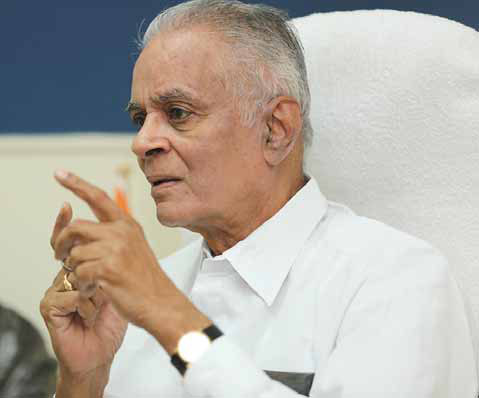
However, when the private sector provides so much higher education, leave aside encouraging it, the government looks upon it with suspicion. And that is the tragedy of today’s higher education system. Maybe we unnecessarily say that there are too many universities, too many colleges in India. In the USA, for example,which has 1/5th of India’s population, there are more than 3000 universities. Not that all the 3000 universities are good. Only few, hardly 10 or 15 Ivy League American Universities are ranked among world class universities.
Now there is always a cry that not a single Indian University is in the list of 100 top world class universities. It is impossible that any university in our country can be among top 100, the chief reason being that the parameters that are applied to world class universities are totally different. Say for example Stanford, Oxford, Cambridge, Princeton... name any. They have their emphasis on research, on excellence, on innovation and most importantly there is an element of exclusivity. Out of 1,000 applications, those universities are so selective, that only the most talented students are selected.
Now, let us take the expectations from Indian universities. The government and the public both demand that universities show excellence in studies as well as in the quality of education. Then as I told you, there is need for expansion. If you want to create a world average of GER which is 27, then we will have to create 800 new universities and 40,000 new colleges which is just impossible for any government.
As I told you, the government doesn’t allow the private sector to come forward. The worst part is that whereas the licence raj has disappeared from the industry, it is very much rampant as far as higher education is concerned. How many councils have control over higher education? There is a medical council which controls medical education, AICTE controls management and technical education, the Bar Council controls legal education, the Architectural Council controls architectural education. There are as many as 17 councils which control various disciplines of education. And as if this number is not adequate, there is an apex body called the University Grants Commission (UGC).
Now under these circumstances and the expectations which I narrated, expansion is necessary. We want 50 per cent reservation in our colleges. And we also expect that every graduate who comes out of university or college must be employable. So we need excellence, expansion, equity and employability. Now under these circumstances, is there a remote possibility that any Indian university can be among the top 100? No. And those which are in the top 100 are invariably private universities in USA, UK, or China. And they enjoy a high degree of freedom and autonomy. The government just doesn’t interfere with them.
There should be only one regulatory authority, an accreditation body. That body should invite applications from universities and institutions and give you an A, B, C or D grade, depending on your financial capacity, your talent. The solution is to have only one window for uniformity and allow universities to flower in their own way
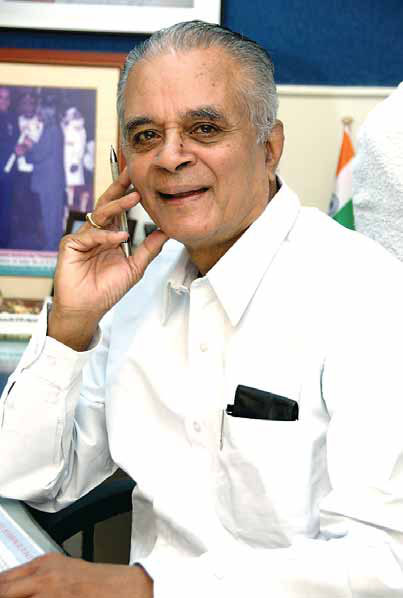
If it is a state subject it means the state will have its own body to decide how many medical colleges and engineering colleges it should give permission to. We need not go to the central government’s HRD department. Now, because it has become concurrent, the powers of the state government have been subordinated. For example, if the central government gives me permission to start an engineering college and the state government doesn’t want it, I have to go to the High Court, as the Central Act overrides the State Act.
I’ll give you a recent example. Sanskrit Vidyapeeth, a deemed university, has already opened eight campuses in different cities. According to this UGC regulation, you cannot open more centres. Because it happens to be a Sanskrit University, the Ministry of HRD asked UGC to amend the particular clause of restricting the number of offcampus centres a university can open, only for Sanskrit University. Whereas in the case of Symbiosis, it declined permission to open an offcampus centre in Hyderabad, although the state government there gave permission. We have purchased land, constructed buildings and have appointed stafftoo. Such adhocism has become rampant. Every government has its own subjective assessment.
The only solution is - I have very often stated this and people are tired of hearing my sentence - we got political freedom in 1947, economic freedom in 1991 but what about educational freedom? When are we going to get that?
As I told you higher education is strangulated by rules,regulations and articles of the Act. Unless this strangulation disappears, there can be no progress in the quality of education.
More than 65 per cent of India’s population is below 39, more than 54 per cent of India’s population is below 25. So India is the youngest nation and there is place for higher education. Now if you can’t give jobs to our youth, then this dividend is likely to become a demographic disaster
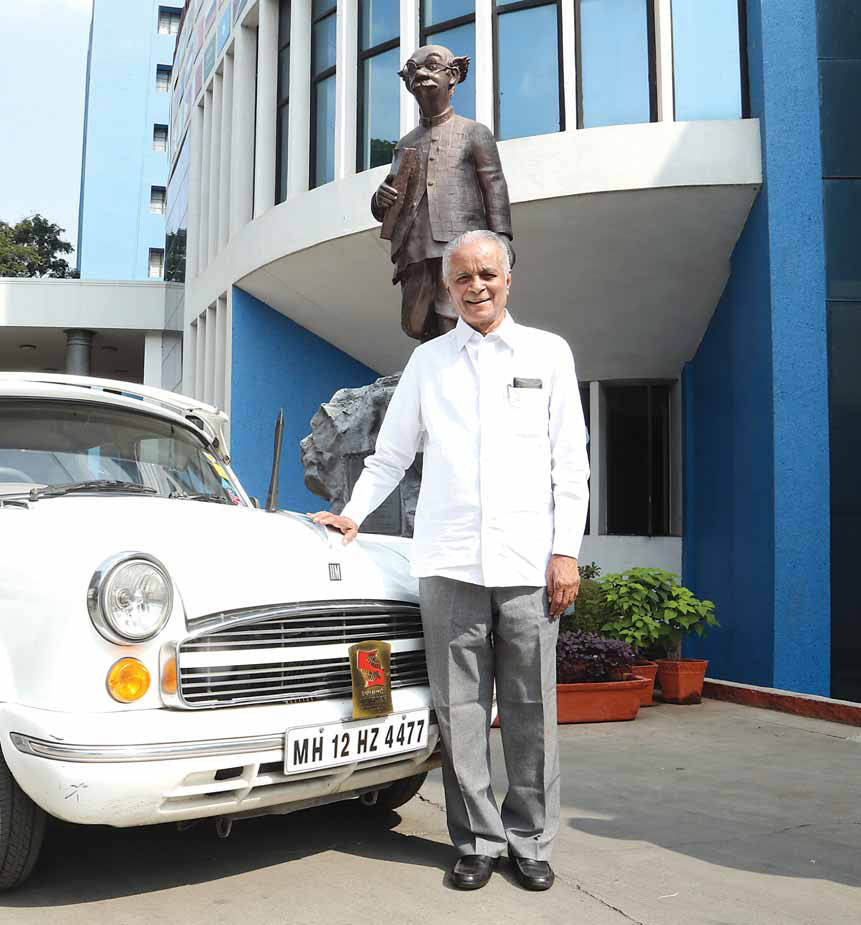
Every youth in this particular age group must have some skills. Otherwise what can happen is what happened in Uttar Pradesh. For 22 odd clerical posts, there were lakhs of applications. For a constable’s or a soldier’s post, the applicants are graduates, post graduates and even PhDs. That is the defeat of the present higher education system. And today ITIs have become useless. They churn out low end, mediocre skilled manpower. So why not have skill colleges like the skill universities that exist in Germany, China and the USA. That will solve our problem of employability. Employability is a sacred issue for which we need an education system which will make our youth employable. But here we are talking about management education, professional education. This is a separate issue.
There are about 35,000 colleges in our country. Why not ask them to start at least one wing for skill education? They have the infrastructure ready and all the government needs to do is to give them a grant. We need at least 1,000 skill universities and 10,000 skill colleges. And only then will our youth become employable.
Instead of us going abroad and opening branches there, it is always better to attract foreign students here who will then become our cultural ambassadors. They will be carriers of goodwill as far as India is concerned. But, before that, we must make the environment, friendly for foreign students. Why should they come to India?
By the way, only Afro Asian countries send their students to us. And even in those countries, only lower middle class families send their children to India. Those who are well offstill send their children to Europe, USA and Australia. One lakh Indian students go to USA every year and we lose four billion dollars in foreign exchange. As against that, only 30,000 to 40,000 foreign students from Afro-Asian countries come here. And we provide them a very unfriendly environment. I need not go deeper into the difficulties that are faced by African, Chinese or Thai students, for that is a separate issue, but certainly the police department, the general public or for that matter, even the government treats them shabbily. In fact, our government has no machinery to attract foreign students to our country. Whereas the USA has tremendous machinery to attract foreign students through their embassies and consulates. Every embassy has an education attaché. We don’t have any education attaches in any of our embassies in Afro Asian countries. We have an education attaché only in the American embassy
So, firstly, there has to be a body to promote higher education abroad. In fact, UGC used to send committees to various countries like Kenya, Uganda and Tanzania, to organise education fares. It has stopped doing that now – it should revive that. Secondly as I told you, they should appoint education attaches in at least the major African countries. There should be a special International Cell in the HRD ministry or UGC. At present the welfare of foreign students is taken care of, not by the UGC or HRD. It is taken care of by the Indian Council for Cultural Relations (ICCR). ICCR is a body of the Ministry of External Affairs. How does it have anything to do with foreign students in India? Everything is done without logic.
There is no desire.
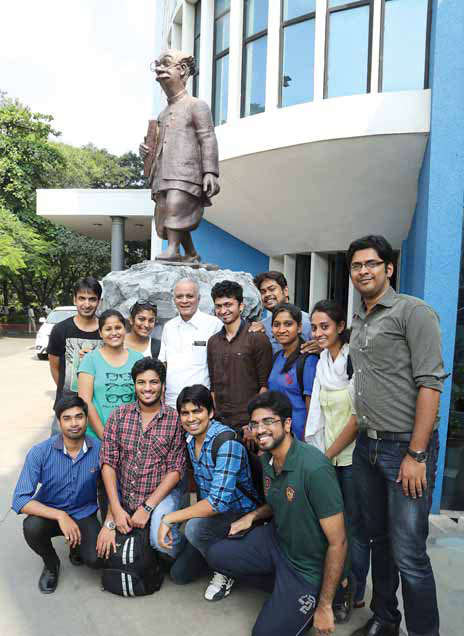
Absolutely not! As I told you there is not much hunger for management education - all over the world, the interest of youth in management education is declining. Even in Symbiosis, even in India. We used to get lakhs of applications for SIBM, but not now. We get a few thousands only.
There was a time when management education was the ultimate moksha. Once you get admission -- if you got into IIM good enough, but even if you got into some other institution of some repute, like say, Symbiosis, IMDR, PUMBA -- it was seen as a big triumph. But then politicians and industrialists smelt money in this, and they started private and autonomous educational institutions which were initially not affiliated to any university, nor approved by the regulatory authority. Ultimately AICTE had to step in and bring in a rule that even private educational institutions, even if they confer a diploma, will have to take the approval of the AICTE. Many institutions did that but now, as far as Pune is concerned, I am told there were 170-odd B Schools out of which 50-55 have closed down. There are 174 applications with the AICTE from management institutions all over the country who want to close down. Because all over the world, especially in India, the trend is, if you don’t get a job or only get a clerk’s job after doing an MBA, then what is the use? And in addition to that, there is recession.
Management education will have to look at fresh innovative strategy. Management institutions in future should not depend only on teaching marketing, finance, HR. It must include certain courses from labour laws, literature, language, music, so that students who come out of good management institutions are not only good at marketing but are good candidates to occupy any chair in any organisation, not necessarily industry. He or she can be a good candidate for the IAS and can compete in UPSC or MPSC examinations. So the overall personality development would be important. Softskills is another area that MBA institutions should look at. Again it means you have to make every MBA not only employable but he should get employment in a good industry at a higher salary package.Merely giving them any kind of job is not enough. For that you can give vocational education or as I told you skill education. But MBA is not skill education. It is professional education and so students want to enter into a profession at a managerial level. Every MBA student aspires to become a manager, which is not possible these days.
Absolutely! These are outdated rules. They bring the rules from Harvard and Oxford. For example, why should every professor be a PhD? Why must every associate professor be a PhD? It is very difficult to find them. And my personal experience is that a good researcher may not be a good teacher or a good teacher may not be a good researcher. Do you want researchers in educational institutions or good professors who teach quality education?
I have seen many teachers who were not PhDs but they were inspiring. And the role of the teacher has become redundant in the conventional sense of the word.
I joined Fergusson College in 1963. That time there used to be 100-150 students in a classroom. I was teaching Botany. I knew more details about a topic in Botany than the students. So I used to give them lectures. I used to explain the topic. I used to demonstrate the plant or animal. Now because of advances of technology, the Internet has become their guru. So if I select a particular topic, say evolution, the student knows much more about evolution than his own teacher. So as far as content is concerned, it is available on the internet. Even delivery technology has entered into the delivery of education too. There are PowerPoint presentations, there are virtual classrooms, and so on. So I often say that technology will not make a teacher jobless, but a teacher who doesn’t use technology in the classroom will be replaced. A teacher must bring technology into the classroom. Merely using a black board, white chalk and giving lectures is not enough. Every classroom should be a seminar, every classroom should be a question-answer session.
Yes! The classroom should be a seminar, the classroom should be a workshop. It is a two way process. Formerly, when I was a professor, it was a one way process. I used to deliver lectures, students used to write down notes. So I used to transfer information from the textbook to the notebook. The teacher’s role now has become that of a mentor, guide, rather than one who is imparting information or disseminating information. You can’t cheat today’s students.
The first difference that I see in MBA students today and MBA students then is that they rely heavily on technology.

Yes! It has increased tremendously. It has increased for the simple reason that there are nuclear families and most of the parents have either one or two children. They are liberal in giving them pocket money. I was aghast when I realised that some parents give pocket money to the tune of Rs.25,000 to Rs.35,000 per month. Whether you like it or not, for many professional courses, students belong to reasonably higher middle class families and they pamper their children. Bad habits are formed more at hostels than in homes. Day students are less susceptible to drugs.
Now it is a very serious problem. It is increasing every year. For example this year we suspended as many as 10-12 students, and all of them were living in hostels.
Surprisingly a few years back it was restricted to boys but now girls are also involved in consuming alcohol and drugs. So this is another side to present day students. And surprisingly if you want to rusticate a student, you can only do it if some drug is found in his room.
However, there are some really intriguing cases. His attendance is very satisfactory, his academic performance is satisfactory, his periodical tests performance is also satisfactory and at the end of it he comes out of the examination in flying colours. Which means some students at least, though addicted,consume substance with responsibility. They know where to stop. Some students candidly admit, yes, I drink, so what? It’s an experience. I drink beer or whisky or take drugs. What is so great or bad about it?
You can’t. You can terminate a student only for the possession of drugs, which is a crime. You can’t terminate him for poor attendance or poor academic performance. No. These are difficult cases. There are a few professors in Symbiosis who are educated abroad. I asked them the same question. What is the situation at Harvard? They said, it is the same. But there the difference is that they do it with responsibility. They know how much to go, where to stop.
Why should we not? Do you think we should disown the students? After all they are our students. They are the sons and daughters of parents who are away from them. The institution has a responsibility. Yes they might have participated in a rave party but do you mean that because of that I should disown them? They need to be counselled. Yes, you have made a mistake, don’t repeat it. I’ll be the last person to spoil a student’s career merely on the basis that he was found smoking hashish or he participated in a rave party where alcohol was consumed.
Absolutely. I believe police action is also sometimes arbitrary. Yes they are young people, they have come on some picnic. Not that all students take drugs. Not that all students consume alcohol.
Counsellors do counselling and therefore every teacher should be a counsellor. You need not appoint a separate counsellor. As I told you a teacher has lost his traditional role of teaching. The blackboard and chalk have become redundant. Then you can at least become a mentor. You can at least become a counsellor. If every teacher adopts 10 students and meets them over a cup of coffee every evening and discusses topics freely, it would be the best form of counselling. Why in the classroom? We must become unconventional. Sometimes I feel that the traditional architecture of the classroom should also be changed. These rectangular classrooms and these rows of benches and boys and girls sitting, resembles more like an industry, like an assembly line production
The future generation will have to look into a dictionary to know the meaning of the word `family’. Where is the family? What do you mean by family? Live-in relationship -- isn’t that like a family? So the definition and concept of family is also undergoing a massive change. We are getting more and more Americanised.
There is something called ‘soft power’. Prof. Joseph Nye, a Harvard professor coined this term. Softpower means winning somebody more by attraction than by coercion. Winning somebody not by military power which he calls hard power or coercion or sanctions. He gives examples of Hollywood, colas, pizza, books and novels as softpower. America has succeeded in winning the hearts of the people in many countries because of this softpower. You need not employ hard power or military power to win a country. No. It’s useless. But Americanise the minds of the people. One lakh students go to America every year. Don’t you think they get totally Americanised? Many of them settle there, for America is a land of opportunity for talented people. It provides wonderful salaries, and retains people. It encourages them to do research and they do it. They create an environment which is favourable and those less talented are thrown back to their own country. This is softpower.
To be honest, I have not done anything deliberately to inculcate values, or my views, or my ideas either on Vidya or Swati. But may be the environment in which they have grown up might have influenced them. How did their father create Symbiosis? How did their mother get up early in the morning so that Vidya could study well to get admission at B.J. Medical College. You know these contributions or sacrifices made by parents go a long way in shaping the children’s personalities. Now that you have mentioned about my daughters, take it from me that the 21st century belongs to girls/ women. In the 2015 UPSC examinations, all top four posts went to girls. You take any competitive examination, girls outshine boys. So the time has come to take more care of boys rather than girls.
Future classrooms should have no walls. Students should be encouraged to learn outside the classroom, more than inside. They should participate in community services and outdoor activities. And now because of technology, the wall has become the laptop and Internet
Girls are very shrewd. Boys fall prey to so many temptations like alcohol, smoking. Girls are also doing it, but not to the extent that the boys indulge. Parents traditionally gave more freedom to sons than daughters, but now they have to take more care of their sons rather than their daughters.
At this age of 81, I am really a contented person. Yes! Many storms did come. But I had the courage to overcome them. And perhaps certain values that I might have adopted from my reading, from my parents, might have given me the inherent courage to face the bad times. Now I have come to the conclusion that simplicity, spirituality and honesty - if you have these three qualities - you need not bother about anything. I have realised that.
Like I just said simple lifestyle, minimum needs, spirituality, honesty and integrity. People say that everything is changing. I don’t agree. There are some immutable values which have not changed for millennia. Honesty has not changed. Integrity has not changed. These are the good values for your own benefit and for the benefit of your organisation. If I start taking donations, for a few years I’ll be a prosperous educationist, but then I’ll be killing my institution with my own hands. So you have to avoid temptation. In order to avoid temptation, you have to make your lifestyle simple
I like my Ambassador. And I’ll tell you why. In 1978 I had a very bad accident. I was travelling from Mumbai to Pune and near Talegaon, the driver dozed off and the car had a head-on collision with a truck. The truck driver did not flee and I was taken to hospital by him. The car had made a 180 degree turn. It was a terrible accident and many people told me, Dr. Mujumdar you were saved because of the Ambassador. The doors are so strong and thick. So it has given me a second life. It is a good car but unfortunately the company got closed.
By VINITA DESHMUKH